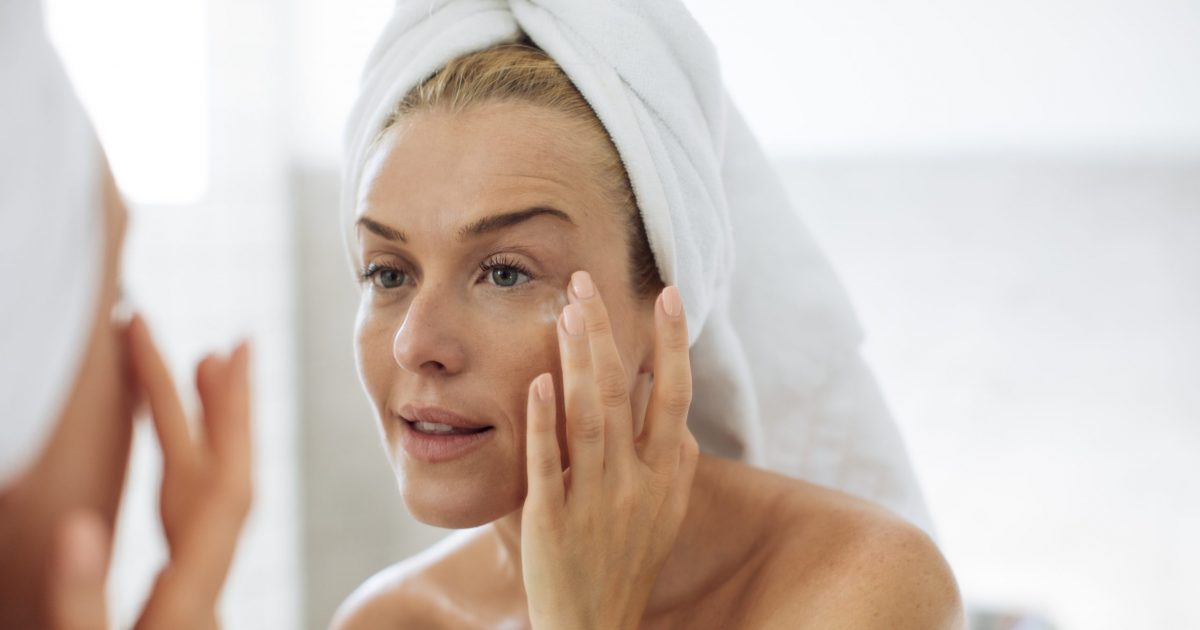
How to Increase Elasticity in Your Skin Naturally
- July 15, 2022
Men and women alike ask how to minimize wrinkles, sagging skin, fine lines, and other signs of premature aging. These skin aging conditions can be exacerbated by a loss of elasticity in the skin. Thankfully, we can educate concerned patients on how to increase elasticity in the skin naturally through lifestyle changes and supplementation.
What is Skin Elasticity?
Skin elasticity refers to the natural stretch and movement of the dermis or the middle layer of skin. Smile, then frown, to notice how much the skin around your mouth and nose stretch. We don’t often think about skin as stretchy, but it can eventually lose this springy feature.
Elastosis is the clinical term for loss of skin elasticity. When elastosis sets in, the skin may appear leathery, saggy, or wrinkled.
The protein that gives our skin this natural ability to stretch is elastin. The Cleveland Clinic explains that elastin resembles a rubber band with its ability to extend and recoil repeatedly. Elastin is not only found in skin cells but also in the bladder, ligaments, lungs, and any other organ that contracts and expands. Elastin is composed of the amino acids desmosine, glycine, isodesmoines, and proline.
Elastin works in tandem with collagen, a protein that keeps skin firm by providing structure, plumpness, strength, and support. Patients might explain they are using collagen supplements as part of their anti-aging skincare routine to try to improve their skin elasticity. While these efforts may improve the quality of their skin, it’s not inherently affecting elasticity.
As we age or manage certain illnesses, elastin production naturally wanes. Here’s what might be expediting the aging process in younger patients.
How Do We Loose Skin Elasticity?
The following conditions and disorders negatively affect elastin production. If you see one of these on your patient’s chart, review how it’s being managed and ask if the patient is looking for additional solutions or management tips. If so, explain that a new treatment may in turn, improve their skin elasticity.
- Atherosclerosis: When plaque builds up in the arteries, this may be a warning that elastin production is decreased.
- Cutis laxa: Patients with this disease have a gene mutation in the elastin gene. This directly affects the quality and quantity of elastin they produce.
- Emphysema: This lung disease may also indicate a decrease in elastin production, especially if the emphysema is progressing rapidly with acute shortness of breath and wheezing.
- Supravalvular aortic stenosis (SVAS): This heart defect is caused by a defect in the elastin gene.
- Williams Syndrome: This developmental disorder is also caused by an elastin gene abnormality.
Talk with your patient about their options for managing any contributing health conditions to improve their overall skin health.
How to Boost Elastin Levels Naturally
As you consult with patients, offer these non-surgical, anti-aging skincare suggestions to help stimulate elastin production in the body and boost their overall health.
- Adopt a skincare routine. As we get older, we must give the skin a little extra TLC to minimize signs of aging. Discuss the benefits of exfoliation, chemical peels, and enhanced cosmetics. Recommend daily skin lotions containing hyaluronic acid, SPF 30 or higher, peptides, retinoids, amino acids, and vitamin C. Some patients may appreciate a referral to a dermatologist specializing in anti-aging skin care treatments and skincare products.
- Consider hormone replacement therapy (HRT). Dermatology Times shares that bioidentical hormones “have been shown to increase skin hydration and reduce skin atrophy.” Hormones to consider testing and supplementing include testosterone, estrogen (especially for women in menopause), thyroid, progesterone, melatonin and DHEA.
- Eat a healthy diet. The Wellness Way explains that a diet rich in antioxidants, collagen, omega-3 fatty acids, sea salt, water, and vitamins A and C are imperative for skin health. Adding fatty fish, berries, bone broth, avocados, and beans to meal plans can help. You may also discuss how avoiding processed foods, especially those high in refined sugar, can reduce skin issues.
- Establish an exercise routine. Getting regular movement each day increases your metabolism and blood flow, promoting healthy skin and rejuvenation. For patients new to exercise, suggest a daily walk that gradually increases in length and difficulty.
- Reduce sun exposure. Both indoor tanning beds and outdoor sun tanning may cause skin damage or skin cancer. Wearing hats, sunglasses, long-sleeved shirts, long skirts, and long pants can protect the skin from sun damage.
- Stop smoking. The chemicals found in both traditional cigarettes and electronic varieties break down the quality of the skin tissue, which speeds up the aging process.
- Take herbal supplements. Enjoying a morning cup of green tea, a refreshing post-workout aloe vera drink, a simple ginseng capsule or collagen protein added to a smoothie can help boost skin elasticity too.
- Use quality topical sun protection. Browse the ingredient list in the sunscreens you recommend. Do they contain retinol, vitamins, antioxidants, Dehydroepiandrosterone (DHEA), estrogen, and hyaluronic acid?
Hormone Testing Options to Consider
As you guide patients through the steps to obtain healthier skin, use diagnostic testing to track their progress.
We suggest the following:
Have questions about obtaining lab supplies, test kits, or results? The Access Medical Labs team is ready to answer. Contact us today!
More About Dr. Ghen

Mitchell Ghen, DO, Ph.D. has 33 years of experience in Anti-Aging and holistic and integrative medicine. Along with his work in nutritional medicine, “Dr. Mitch” has a remarkable amount of experience as an expert clinician and researcher in the field of stem cell transplantation.
In addition to being a physician, Dr. Mitch holds a Master’s Degree in Biomechanical Trauma and has a Ph.D. in nutrition and psychoneuroimmunology. He is an international lecturer on oral and IV nutrition and stem cell transplantation and is recognized as one of the premier teachers at conferences and seminars on integrative medicine. His private practice is in Boca Raton, Florida.
Dr. Mitch’s vast academic knowledge, coupled with his entertaining delivery, makes him one of the most sought after personalities in his field. Currently, he is a medical director for several Natural Medicine companies and a consultant for physicians worldwide, teaching them how to implement integrative medicine into their practices.
He is the co-author of four textbooks including the “Advance Guide to Longevity Medicine,” “The Ghen and Raine’s Guide to Compounding Pharmaceuticals,” “The Anti-Aging Physicians’ Handbook for Compounding Pharmaceuticals,” and “The Essentials and Science of IV Parenteral Medicine.”